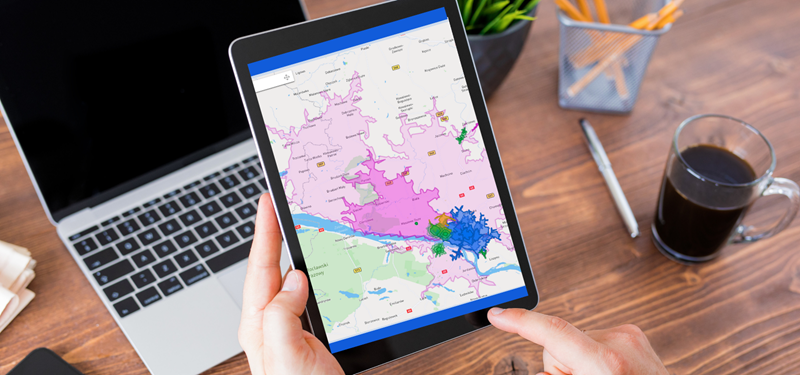
Location Intelligence (LI) has become increasingly vital in today’s business and technology landscape. As digital technologies evolve and data availability continues to surge, the applications for this data are expanding rapidly. Location Intelligence is now a key tool in both commercial and public sectors, playing a crucial role in activities ranging from urban planning to disaster mitigation. According to Forbes, 75% of entrepreneurs consider geospatial analysis indispensable for achieving their business objectives. But before diving into the myriad possibilities of this technology, let’s start with the fundamentals.
What is Location Intelligence?
Location Intelligence (LI), also known as spatial intelligence, involves the collection, analysis, and application of geographic information. It integrates spatial data with other datasets, such as demographic trends, traffic patterns, or weather conditions, to create comprehensive insights that enhance decision-making.
Spatial data can be sourced from a variety of places, including satellite imagery, public statistics, and internal business records, such as store locations or customer addresses.
These diverse data sources are then integrated and analyzed using advanced tools, providing valuable insights that drive smarter business decisions.
How Does Location Intelligence Work, and What Do You Need to Leverage It?
Location Intelligence relies on various technologies to collect, process, and analyze geographic data. The most critical tools include:
- GIS (Geographic Information Systems): Tools for storing, analyzing, and visualizing spatial data.
- IoT (Internet of Things): Networks of devices equipped with sensors that collect and transmit data in real-time, enabling the monitoring and management of resources across multiple locations.
- Big Data and Cloud Computing: Technologies that allow for the processing and analysis of large datasets in the cloud, facilitating scalable analytics and the integration of diverse data sources.
These are just a few of the technologies involved. Organizations may also utilize other tools like LiDAR, Machine Learning, or Augmented Reality.
The Benefits of Location Intelligence for Businesses and Organizations
Location Intelligence empowers organizations to make faster, more informed decisions at both the operational and strategic levels. By combining data with geographic context, businesses can conduct more reliable analyses, supporting activities like new investment planning and long-term strategy development.
Moreover, Location Intelligence can serve as the cornerstone of your business offerings. This technology has been pivotal to the success of on-demand services like Uber and Bolt, where real-time tracking of driver locations is a key feature.

Location Intelligence Use Cases

Location Intelligence for Spatial Planning
Urban planners can harness geographic data to create sophisticated designs that account for far more variables than traditional methods allow.
Organizations can analyze data related to the environment, road traffic, weather conditions, topography, temperatures, and more. This holistic approach enables the effective management of greenery, streets, public transportation, and technical infrastructure.
Institutions like the Municipal Planning Office in Łódź utilize geospatial data and data processing solutions to enhance urban planning. For example, the Office employed the FME Platform and spatial data to develop a 3D model of the city, which has significantly improved urban space management.
Another example is GEOPOZ, which uses similar technologies to share information about Poznań with its residents. Meanwhile, MGGP Aero leveraged Location Intelligence to create a national tree registry, aiding in the management of green spaces, environmental protection, and climate change mitigation.
In MGGP Aero’s project, over 19 TB of data was processed to create the Regional Tree Crown Map, a comprehensive database covering more than 5 billion trees in Poland. This case highlights the importance of not just having access to vast amounts of data but also processing and utilizing it effectively.

Location Intelligence for Investment Planning
Selecting the right location is a critical factor in the success of retail and service outlets. Commercial companies can leverage Location Intelligence to identify the most promising sites for new investments. One such tool is our GIS solution, GeoGrid, which enables users to analyze the potential of various areas by considering factors like demographics, access to public transportation, and proximity to competitors. The system can also evaluate existing commercial real estate, such as office buildings, to help you select the most suitable option for your needs. The applications of Location Intelligence in investment planning are vast, with many more examples demonstrating its value.

Location Intelligence for Route Optimization and Field Service Management
One of the most common applications of Location Intelligence is optimizing routes using geographic data. Route Optimization solutions, such as Google’s Route Optimization API, analyze factors like distance, traffic, road conditions, and destinations to plan the most efficient routes. This leads to reduced driving times, lower fuel consumption, and minimized CO2 emissions. Additionally, Google’s Route Optimization API can plan routes for multiple vehicles simultaneously. By leveraging Location Intelligence and the right software, businesses can significantly reduce operational costs and improve effectiveness.
Google’s Route Optimization API easily integrates with Field Service Management systems like GeoTask. These systems help create optimized schedules and support fieldwork for mobile employees, such as technicians fixing electrical outages or insurance agents conducting damage assessments. With the combined power of the API and GeoTask’s optimization, you can design more efficient routes between different task locations, ensuring that mobile workers complete their tasks more effectively.

Location Intelligence for Retail Stores and Service Points
In today’s digital world, it’s almost impossible to find a store, service, or restaurant without accurate online information. The most convenient way is through a smartphone app that not only provides an accurate location and route but also offers additional details like reviews, ratings, service overviews, or menus.
Store Locator is a solution that enables businesses to easily add detailed information about their locations on a map. The app includes essential details such as the company name, address, contact information, opening hours, customer reviews, and distance from other locations. This ensures that potential customers have all the information they need, improving their overall satisfaction. As a result, they’re more likely to return or recommend your service to others, positively impacting your financial performance.
Keeping your company’s profile information up-to-date is as crucial as its online presence. For businesses with multiple locations, manually updating each profile can be time-consuming and cumbersome. The Business Location Services solution addresses this challenge by allowing you to manage all your business profiles from a single, central dashboard.

Location Intelligence for Insurance Companies
Insurance companies can harness geospatial data to better assess risks, enabling them to create more accurate and tailored insurance offerings.
Several factors influence real estate insurance rates, including the distance to flood or tornado-prone areas and proximity to fire stations. By utilizing Location Intelligence, insurers can calculate rates based on a comprehensive analysis of these factors, resulting in:
- More Accurate Rates: Insurance rates and coverage can be finely tuned to match each customer’s specific circumstances, leading to greater customer satisfaction.
- Risk-Adjusted Pricing: Rates that closely align with the actual risk help minimize potential losses for the business.
In this way, Location Intelligence becomes a powerful tool for building a competitive advantage in the insurance industry.
For a deeper dive into how insurance companies can use geospatial data, check out our article: Effective Use of Geospatial Data: Application of Location Analytics in the Insurance Industry.
Summary
Location Intelligence is a rapidly evolving methodology that continues to gain significance across industries. As access to valuable geospatial data expands, so too will the importance of the skills required to collect, process, analyze, and apply this data in strategic and operational decisions. Companies that master these capabilities will sustain a sharp competitive edge.
Public institutions also stand to benefit. Modern technologies enable them to manage urban spaces more comprehensively and create projects that address societal needs effectively.
If you’re interested in integrating Location Intelligence into your organization, don’t hesitate to reach out to us. At Globema, we offer ready-made applications that can be customized to your specific needs, as well as personalized solutions tailored to your unique requirements.











